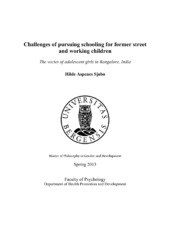| dc.description.abstract | India signed the Right to Education Act' in 2009. However, national policies in India do not always acknowledge the most vulnerable groups, in particular the group of street and working children and girls. This study is concerned with the challenges of pursuing schooling for former street and working children in Bangalore, India, with a focus on adolescent girls. The research aimed to map the challenges perceived and experienced by adolescent girls in schooling in order to gain a greater knowledge of how to improve access to quality education as a step towards improving their life circumstances. By combining the categories of street children and working children with adolescent girls, the study highlights the less visible group (i.e. adolescent girls) who have street and working backgrounds as beggars and domestic workers (i.e. work that tends not to be recognised in statistics) and explore the connection to the girls' challenges of pursuing schooling. In addition, exploring their points of view regarding the real obstacles street and working children and the NGO face in the education perspective, will help in identifying some of the gaps that remain in promoting meaningful schooling for this group. This in turn contributes to the body of qualitative studies on education targeted at street and working children, and could be important for informing policy and practice in the area of education and possible improvements of life conditions of street and working children in India. Data were collected from interviewing former street and working children, staff and directors from the non- governmental organisation (NGO) called Association for Promoting Social Action, as well as from members in the Child Welfare Committee. The empirical findings were divided into three categories exploring the girls' prior schooling and social situations, the girls' present situations regarding the involvement with the intervention programs, as well as the girls' future aspirations. This study found that the obstacles experienced early in the girls' lives have had a continuous influence later in life also. Moreover, the girls' stories and the NGO's perspective in accordance with critical poverty theory, empowerment theory, and stigma and shame theory have shown that complex situations require multifaceted solutions on different levels. | en_US |
